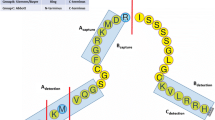Abstract
Cardiac Ischemia is an important trigger for the release of B-type natriuretic peptide (BNP). BNP and N-terminal pro-BNP (N-proBNP) are emerging as important biomarkers for risk stratification in patients with acute coronary syndromes. Higher levels of BNP and pro-BNP are associated with a greater risk for death and heart failure, independent of traditional clinical variables and levels of other biomarkers such as troponins and C-reactive protein. The therapeutic implications of these findings are not yet known.
Similar content being viewed by others
References
Marumoto K, Hamada M, Hiwada K. Increased secretion of atrial and brain natriuretic peptides during acute myocardial ischaemia induced by dynamic exercise in patients with angina pectoris. Clin Sci (Colch) 1995;88:551–556.
Sabatine MS, Morrow DA, de Lemos JA, Desai M, Mannting F, Cooper HA, Antman EM, McCabe CH, Braunwald E. Elevation of B-type natriuretic peptide in the setting of myocardial ischemia [abstract]. Circulation 2001;104(Supl II):II-485.
Tateishi J, Masutani M, Ohyanagi M, Iwasaki T. Transient increase in plasma brain (B-type) natriuretic peptide after percutaneous transluminal coronary angioplasty. Clin Cardiol 2000;23:776–780.
Toth M, Vuorinen KH, Vuolteenaho O, Hassinen IE, Uusimaa PA, Leppaluoto J, Ruskoaho H. Hypoxia stimulates release of ANP and BNP from perfused rat ventricular myocardium. Am J Physiol 1994;266:H1572–H1580.
Hama N, Itoh H, Shirakami G, Nakagawa O, Suga S, Ogawa Y, Masuda I, Nakanishi K, Yoshimasa T, Hashimoto Y, et al. Rapid ventricular induction of brain natriuretic peptide gene expression in experimental acute myocardial infarction. Circulation 1995;92:1558–1564.
Nakamura S, Naruse M, Naruse K, Kawana M, Nishikawa T, Hosoda S, Tanaka I, Yoshimi T, Yoshihara I, Inagami T, et al. Atrial natriuretic peptide and brain natriuretic peptide coexist in the secretory granules of human cardiac myocytes. Am J Hypertens 1991;4:909–912.
Morita E, Yasue H, Yoshimura M, Ogawa H, Jougasaki M, Matsumura T, Mukoyama M, Nakao K. Increased plasma levels of brain natriuretic peptide in patients with acute myocardial infarction. Circulation 1993;88:82–91.
Horio T, Shimada K, Kohno M, Yoshimura T, Kawarabayashi T, Yasunari K, Murakawa K, Yokokawa K, Ikeda M, Fukui T, et al. Serial changes in atrial and brain natriuretic peptides in patients with acute myocardial infarction treated with early coronary angioplasty. Am Heart J 1993;126:293–299.
Arakawa N, Nakamura M, Aoki H, Hiramori K. Relationship between plasma level of brain natriuretic peptide and myocardial infarct size. Cardiology 1994;85:334–340.
Omland T, Bonarjee VV, Lie RT, Caidahl K. Neurohumoral measurements as indicators of long-term prognosis after acute myocardial infarction. Am J Cardiol 1995;76:230–235.
Talwar S, Squire IB, Downie PF, McCullough AM, Campton MC, Davies JE, Barnett DB, Ng LL. Profile of plasma Nterminal proBNP following acute myocardial infarction. Correlation with left ventricular systolic dysfunction. Eur Heart J 2000;21:1514–1521.
Kikuta K, Yasue H, Yoshimura M, Morita E, Sumida H, Kato H, Kugiyama K, Ogawa H, Okumura K, Ogawa Y, Nakao K. Increased plasma levels of B-type natriuretic peptide in patients with unstable angina. Am Heart J 1996;132:101–107.
Talwar S, Squire IB, Downie PF, Davies JE, Ng LL. Plasma Nterminal pro-brain natriuretic peptide and cardiotrophin 1 are raised in unstable angina. Heart 2000;84:421–424.
de Lemos JA, Morrow DA, Bentley JH, Omland T, Sabatine MS, McCabe CH, Hall C, Cannon CP, Braunwald E. The prognostic value of B-type natriuretic peptide in patients with acute coronary syndromes. N Engl J Med 2001;345:1014–1021.
Omland T, Persson A, Ng L, O'Brien R, Karlsson T, Herlitz J, Hartford M, Caidahl K. N-terminal pro-B-type natriuretic peptide and long-term mortality in acute coronary syndromes. Circulation 2002;106:2913–2918.
Jernberg T, Stridsberg M, Venge P, Lindahl B. N-terminal pro brain natriuretic peptide on admission for early risk stratification of patients with chest pain and no STsegment elevation. J Am Coll Cardiol 2002;40:437–445.
Morrow DA, de Lemos JA, Sabatine MS, Murphy SA, Demopolous L, Dibattiste P, Gibson CM, Cannon CP, Braunwald E. Evaluation of B-type natriuretic peptide for risk assessment in UA/NSTEMI: BNP and prognosis in TACTICS-TIMI 18. J AmColl Cardiol 2003;41:1264–1272.
Sabatine MS, Morrow DA, de Lemos JA, Gibson CM, Murphy SA, Rifai N, McCabe C, Antman EM, Cannon CP, Braunwald E. Multimarker approach to risk stratification in non-ST elevation acute coronary syndromes: Simultaneous assessment of troponin I, C-reactive protein, and Btype natriuretic peptide. Circulation 2002;105:1760–1763.
Author information
Authors and Affiliations
Corresponding author
Rights and permissions
About this article
Cite this article
Maewal, P., de Lemos, J.A. Natriuretic Peptide Hormone Measurement in Acute Coronary Syndromes. Heart Fail Rev 8, 365–368 (2003). https://doi.org/10.1023/A:1026103601075
Issue Date:
DOI: https://doi.org/10.1023/A:1026103601075




